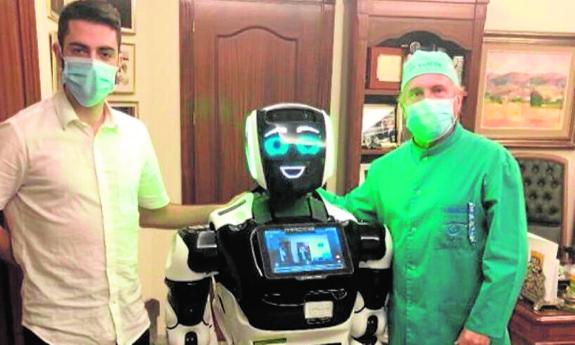Humanoid robots greet patients at Torre del Mar eye clinic to reduce Covid-19 risk
Dr Marcos claims that his is the first eye clinic in Spain to use the androids which can ask medical questions
Eugenio Cabezas
Lunes, 3 de agosto 2020, 14:11
For the last few days patients with appointments at the Doctor Marcos ophthalmologist's in Torre del Mar have been greeted by two humanoid robots, Cr-1 and NAO.
The two androids are capable of taking patients' temperatures and asking them general medical questions related to their appointments as soon as they walk through the door.
The eye specialist confirms that he has introduced them into the clinic to improve coronavirus prevention measures and the risk of infection, but stresses that they "will not lead to redundancies among staff".
Doctor Marcos says that every one of his 11 members of staff has a specific role and that the robots "can't replace human contact".
Cr-1 and NAO, which have cost the clinic over 100,000 euros, are able to assist technicians, optometrists and ophthalmologists. In addition, they can help the fight against Covid infection by taking temperatures using thermal imaging cameras. They can also carry out a diagnostic questionnaire and dry eye tests, among other functions.
Pioneers
Doctor Marcos says that he had been looking into the idea of using robots at his Torre del Mar practice since 2017, following a work trip to South Korea. "Seeing the Samsung society, how they work with technology and how they have managed to keep Covid-19 death rates down is incredible," he reflects.
The acquisition of the two robots has been possible through an alliance he has with the Exener Group and Macco Robotics, both of which are entirely Spanish companies. "That's why we are ahead of the rest," he explains proudly.
This is not the first time that Doctor Marcos has been a pioneer in his field. With experience of working in the USA and Asia, the eye specialist was one of the first in his sector to use laser treatment to treat lazy eye, short and long sightedness as well as performing latest generation ultrasound on cataracts, glaucoma. The list goes on.
As well as the two robots that the Torre del Mar clinic has just acquired, Dr Marcos has also been using robots in surgery. "The famous Da Vinci has the advantages of 3D precision, it's less invasive and has the option of telesurgery."
He adds that the robots can work "in places with high levels of infection or radiation", which is the case now with coronavirus. The doctor also mentions nanorobots, which can help to treat problems such as blood clots.
The biggest disadvantage to using this type of technology, according to Dr Marcos, is the cost. He also points out that programming the robots is "difficult" and that the lack of regulations regarding responsibility is also an issue. "There have been cases of robots causing small burns," he acknowledges.
However, despite the drawbacks, Dr Marcos believes that the question isn't about a "robotic future" but that "robots are already working with patients with Alzheimer's, cancer, in dentistry, with children and elderly people now". He concludes that working with this type of technology is "the new normal".
